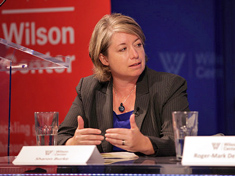-
Not All Security Questions Have Military Answers, Says Sharon Burke
September 26, 2014 By Sarah Meyerhoff
The U.S. military has historically relied on its capacity for technological innovation to respond to new risks and crises. But, as Sharon Burke explains in this week’s podcast, the Pentagon has had to invent a new role for itself in response to a changing world.
The U.S. military has historically relied on its capacity for technological innovation to respond to new risks and crises. But, as Sharon Burke explains in this week’s podcast, the Pentagon has had to invent a new role for itself in response to a changing world.
“Is security getting our kids to school and food on the table?”Burke, who served as the first assistant secretary of defense for operational energy from 2010 to May 2014 and is now with the New America Foundation, explains that when she started working at the Pentagon 20 years ago, oil prices were low and she struggled to find space to pursue energy security. As the threats of the Cold War faded, however, the mission and role of defense agencies quickly became more complex and understandings of national security shifted.
“Is security getting our kids to school and food on the table?” asks Burke. “What prevents us from doing that? Or are you talking about military security and defense threats that require a weapon to counter?”
The Department of Defense now considers longer-term trends that can lead to instability and situations where they might be called on to respond – “systemic-level influences, where it’s gender and demographics and resources and military security all coming together,” she says.
Military leaders must ask, “What‘s that going to look like? And what do we need to live in that world? Because if we don’t start building it now, we won’t have it.”
Environmental change is among these global trends. The military’s signature strategy document, the Quadrennial Defense Review, incorporates climate change, energy security, and water, and the latest National Intelligence Strategy, released last week, includes a section on natural resources and frames climate change as a “threat multiplier.” The Department of Defense has also started to prioritize internal energy security. Burke’s former office, which she helped create, works to reduce costs and risks by managing energy use.
Adaptability as a Virtue
As the forces shaping national security become more complex, so do the choices facing the military. For example, although alleviating poverty is not a military responsibility, says Burke, reconstruction teams in Afghanistan and Iraq had to confront poverty to try to stabilize the areas they worked in.
“We’ve proven to be a very resilient country ourselves…but we seem to be at an unusual juncture”“[The military] understand[s] that all of those questions have to be asked,” she says, “it’s the ‘then what?’ that gets more complicated, and I’m not sure that’s a bad thing, because the truth is there’s not always a military answer to a security challenge.”
For Burke, finding the right answers also depends on a more dynamic political system.
She says she worries about a “brittle, inflexible, and rigid political system” that’s not adapting to major changes on the world stage, like climate change and demographic shifts. These attributes are critical not only to protecting the United States, but also to maintaining its leadership role in the world.
“We’ve proven to be a very resilient country ourselves, politically, over hundreds of years, but we seem to be at an unusual juncture,” she says. “Are we going to be able to continue to play that role going forward, and are we going to be able to marshal what we need to at home?”
Burke spoke at the Wilson Center on September 18.
Friday podcasts are also available for download on iTunes.
 A Publication of the Stimson Center.
A Publication of the Stimson Center.




